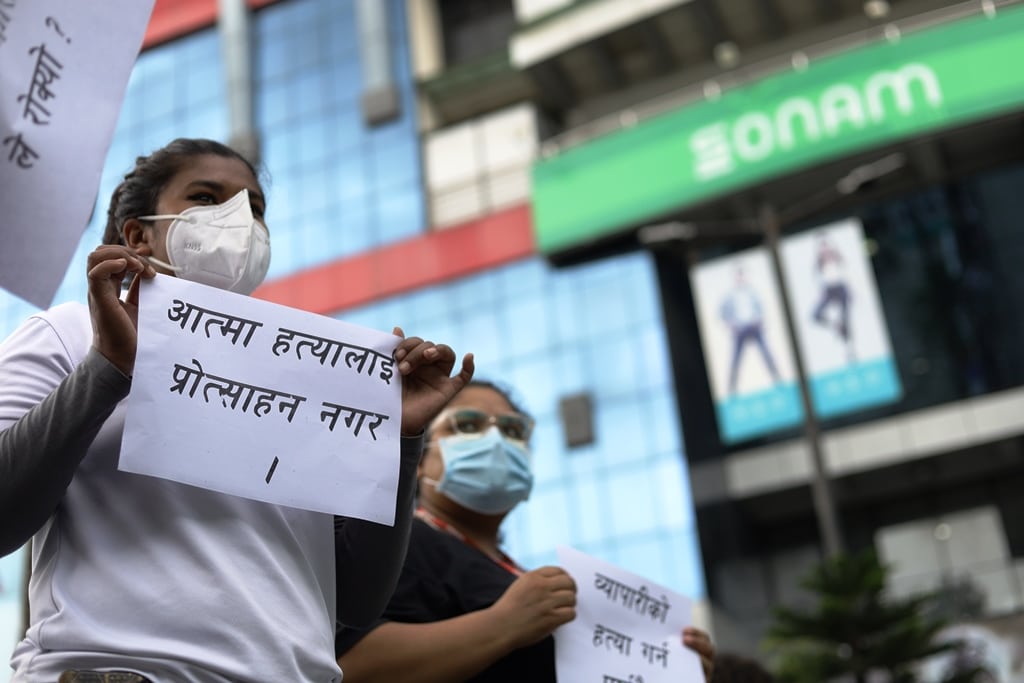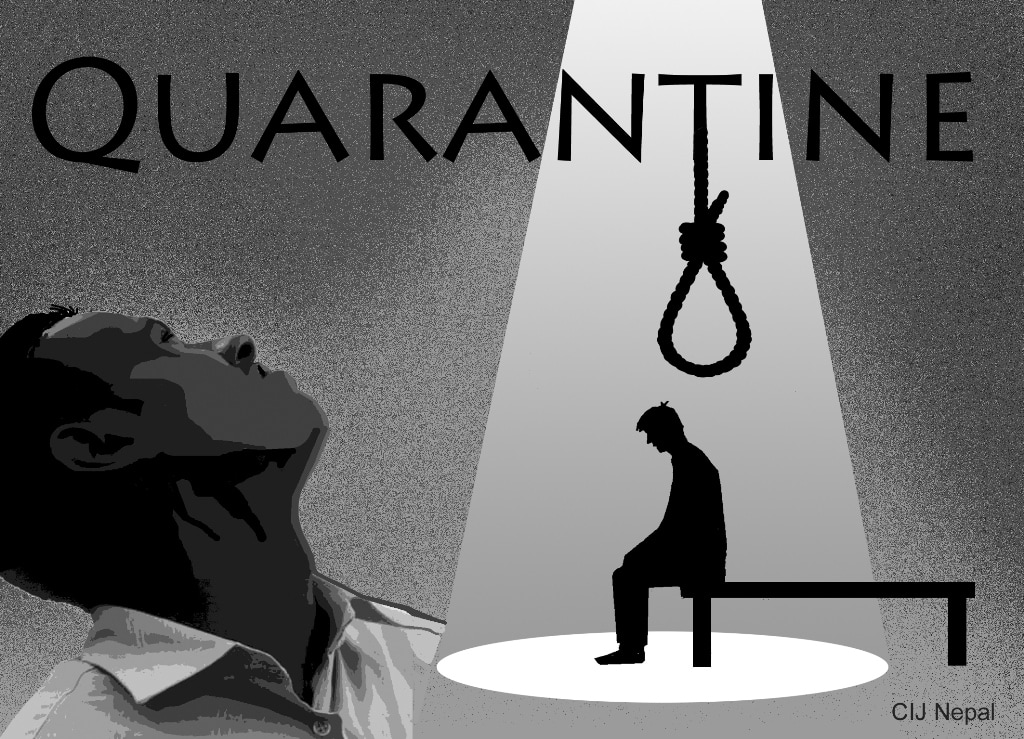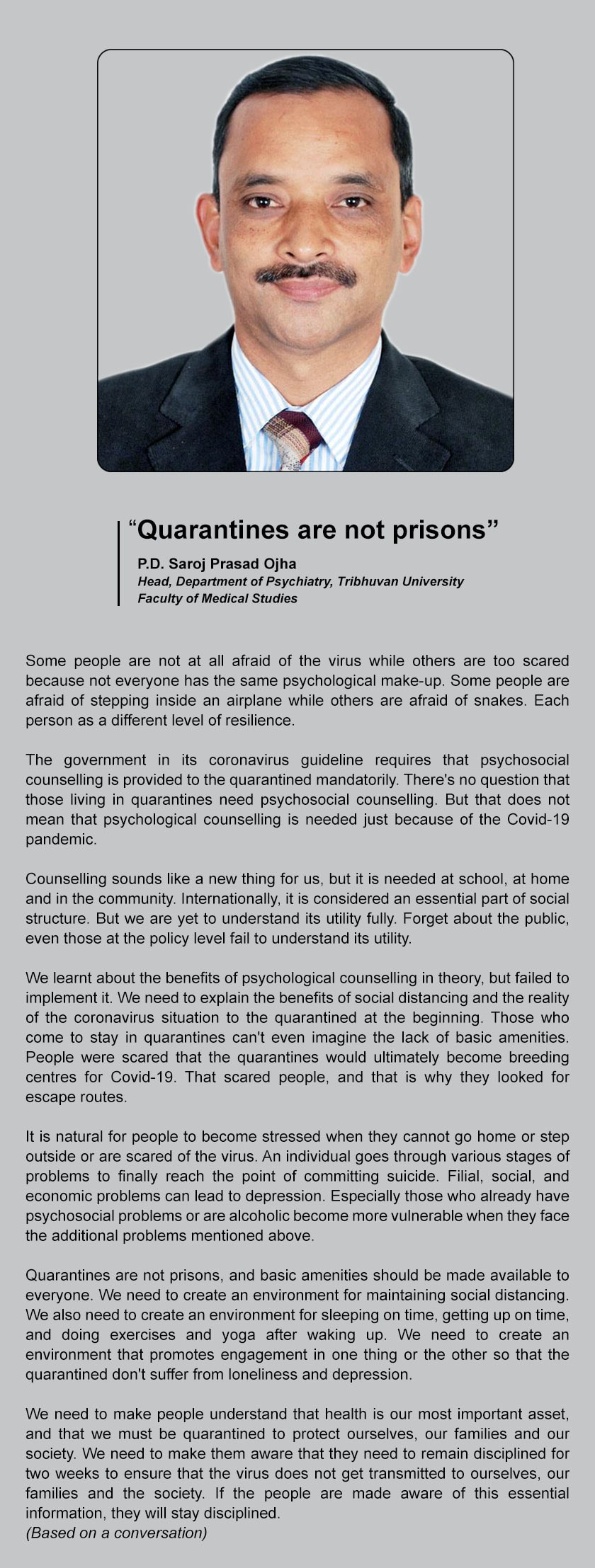Several inmates have committed suicide while many others complain of depression and anxiety as the facilities flout the government’s coronavirus safety guidelines.
Basanta Pratap Singh in Bajhang; Krishna Adhikari in Nepalgunj; and Laxmi Basnet and Bidya Rai in Kathmandu: Centre for Investigative Journalism-Nepal
On June 21, a 30-year-old man committed suicide at a quarantine centre in Pathibhera Rural Municipality-7 in Sudurpaschim Province’s Bajhang district. He had returned from India three days earlier and was being quarantined along with fellow returnees Umesh Bohara and Janak Bohara.
“He’d often say he wanted to lock his room from the outside and head home. He didn’t speak with anyone one day,” said Umesh. “He hanged himself the following day. We came to know about the incident only in the morning.”
The quarantine was ill-managed and failed to meet the minimum standards for safety and wellbeing of the inmates. There was no one to counsel the anxious youth who had returned home. It lacked even basic amenities such as food and lodging. “No one came to the quarantine because of the fear of coronavirus transmission,” said Janak. “The police came once in three or four days, inspected the quarantine from afar, and went back.”
Suicide zones

A shop owner outside Civil Mall holding a sign that says “Do not encourage us to commit suicide.” All shops had been closed owing to lockdown but shop owners were forced to pay rent. Photo: Subhash Shresha
The list of people committing suicide owing to coronavirus-induced anxiety is getting longer. On July 3, an 18-year-old youth from Bajhang’s Khatpad Chhanna Rural Municipality hanged himself upon being informed that he had tested positive for the virus. He had returned from India in a group of 16 and was quarantined for 14 days before being sent home on June 28.
“He was last seen herding buffalo in a jungle nearby,”said Ram Bahadur Singh, spokesperson of the rural municipality. “In the meantime, someone called to inform him that he had tested positive. He was later found hanging from a tree.”
On June 13, a 45-year-old man who was quarantined at Satyavadi Secondary School in Bajura’s Badimalika Municipality-2 committed suicide. He had returned from India two days earlier and had tested positive for the virus on June 14.
Others who committed suicide while being quarantined include a 45-year-old man from Arghakhanchi’s Sitganga-5; a 31-year-old man from Rolpa’s Gangadev Rural Municipality-5; and a 49-year-old man from Tanahun’s Ghiring Rural Municipality-3. All three of them had returned from abroad and were in quarantine when they tested positive for the virus and couldn’t bear the stress after knowing about their condition.
As per the Nepal Police Headquarters, 11 individuals committed suicide in the two-month duration between May 1 and July 9 while being quarantined. Niraj Bahadur Shahi, deputy inspector-general and spokesperson of Nepal Police, said, “Among those who committed suicide, 10 were men and one a woman. All but three of them had tested positive for coronavirus.”
Mental health activist Jagannath Lamichhane said these people ended their lives due to the stigma of having lost social standing and respect due to the infection. “These people often take loans to go abroad. But when they return home with the virus, they’re likely to take any step. This problem can’t be solved through medical care alone.”
[transition] Achham’s Bayalpata Hospital furloughed 32 sanitation workers after the coronavirus pandemic began. One of the workers furloughed doused himself in petrol and burnt himself to death. Dr Bikas Gauchan, the community health service director at the hospital, has claimed the sanitation workers had been removed after the hospital’s donors slashed their budget owing to the pandemic.
Sub-standard quarantines
The “Coronavirus Quarantines Operation and Management Guideline, 2076 (2020)”, prepared by the Nepal Government, requires all quarantines to be equipped with primary aid kits, clean and safe bedrooms, and that distance be maintained between beds.
The guideline also requires all quarantines to have at least three sanitation workers, enough dustbins, masks, separate soaps and sanitisers, and conduct waste management as per minimum standards. The guideline also requires medical tests to be conducted on the quarantined twice a day. It also requires the facilities to conduct regular physical exercise and psychological counselling sessions.

However, these amenities are not available in most quarantines across the country. After their friend committed suicide in the quarantine in Bajhang’s Majhkhori Secondary Schook, Janak Bohara and Umesh Bohara failed to receive any psychological counselling. Unsure of what to do, they invited a local shaman to ward off the evil.
[transition] Dr Rupchandra Biswakarma, in-charge at the Bajura District Hospital, said quarantines in Sudurpashchim Province lacked facilities as per the guideline. “The local levels could not manage due to excessive footfall,” Biswakarma said.
The lack of facilities, though, is not limited to Sudurpaschim Province alone. The National Human Rights Commission in its report published after monitoring quarantines across the country from mid-March to mid-June said quarantines were found to have flouted the World Health Organisation’s guidelines that require sufficient food, water and sanitation, implementation of the basic provision for containing transmission, and single rooms and open space for the inmates.
One reason why the guidelines have been flouted is that most of the quarantines across the country are set up in local schools and community halls. Those structures are not designed to house people at night. In many places, including in the Terai, quarantines are erected by setting up tents in fields or under trees. A woman quarantined in Surkhet said she had to sleep on desks and benches, didn’t get any access to electricity for recharging her phone, and had difficulty getting food and sleeping mattress.
Dr Divya Dawadi, co-spokesperson for the Ministry of Education, Science and Technology, said the school buildings could not meet the guidelines and that they had become allowed space for incidents such as rape, theft, and suicide.
“Schools are made for teaching-learning activities during the day, and not for quarantining people,” Dawadi said, adding that such facilities had become insecure especially for women and children.
The quarantined, though, say the structures of the quarantines are just one of the several problems they faced. The attitude of the managers and volunteers, they said, were equally inhuman. This added to the anxiety of the inmates. They complain that whenever they asked for something, the managers and volunteers would say something to the effect of “Why do you ask for more when you’re getting to eat and live here?”
The quarantines also lack medical testing facilities. A woman who lived in one of the quarantines said she was depressed as she felt she was being quarantined despite being asymptomatic. “I began to think that they might have quarantined me thinking I’d better died there itself,” the woman said.
Mental health experts say those living in quarantines tend to overthink even if they have normal symptoms of sore throat or cold and cough. Moreover, as they have the urden of supporting their families despite losing jobs, they come to the point of committing suicide.
“This is evident if we analyse the financial and family backgrounds of those who have committed suicide,” Dr. Narendra Singh Thagunna said.
The quarantines are particularly taxing for women for fear of being sexually abused and the burden of menstruation. In Pokhara, a pregnant woman worried that the fetus in her womb had stopped moving for a few days. “I felt better only after I was counselled by a doctor,” the woman said.
Mothers who were quarantined along with young children faced a different problem altogether. The children would ask for food time and again. But no food was available except lunch and dinner. Some of the inmates even protested for not receiving test reports on time. On June 12, some quarantine inmates blocked the road in Rautahat, Rajapur for not receiving their PCR reports on time. Three Policemen were injured while trying to clear the road. In other places, inmates ran away from the quarantines. A few of the inmates who ran away from the quarantines in Narainapur in Banke, Narayan Campus and Bhairav High School in Dailekh were apprehended by the police.
The quarantines were disrupted and eventually became ineffective due to a large number of people. The inconvenience faced by the Simta Rural Municipality in Surkhet is a case in point. Kavindra KC, chairperson of the rural municipality, said, “We had about 2,700 people in 48 quarantine centres and one isolation ward in the rural municipality on June 2 2020. Even then, we did not give up.”
According to the National Emergency Service Center, which is under the Ministry of Home Affairs, 1.38 lakh people were in quarantine in mid-June. Since then, the number has been declining. Out of these, 33,737 were women and 4,677 were children. During this period, 267 pregnant women were in quarantine. As of mid-June, 7,110 quarantine centres were in operation across the country.
Psychologist Dr. Narendra Singh Thagunna, who is also the chairman of The School of Psychology, an organization working on suicide prevention, said the number of suicides had increased in the last three months compared to the previous year. According to him, the suicide rate has been increasing by 10 percent annually in recent years. This is evident in the number of suicides in Nepal, which shot up to 1,800 from March 24, 2020 to July 4, 2020. Out of these, there are 649 women and 197 children.
Psychological counselling is essential
 There are cases in Surkhet that show that a person can return to normalcy with good psychological counselling, no matter how tired, stressed, anxious and angry they may be. Anita, who returned from Mumbai, India, in the third week of May, was quarantined before reaching home. She stayed in the local quarantine with her 11-year-old daughter, who was ill, and two other local boys. She said she was worried that she would not be able to reach home and meet her son even after reaching the village.
There are cases in Surkhet that show that a person can return to normalcy with good psychological counselling, no matter how tired, stressed, anxious and angry they may be. Anita, who returned from Mumbai, India, in the third week of May, was quarantined before reaching home. She stayed in the local quarantine with her 11-year-old daughter, who was ill, and two other local boys. She said she was worried that she would not be able to reach home and meet her son even after reaching the village.
 At the quarantine, Anita faced several problems. The school building had poor ventilation. She had to spend her day sitting outside in the afternoon. The toilet was far away. She was worried about her physical safety when she went to the toilet at night. She had her youngest daughter by the side. There would be no one to talk to or to comfort her. Those who came to see her talked to her briefly from a distance and returned quickly. She felt ostracised, she lamented.
At the quarantine, Anita faced several problems. The school building had poor ventilation. She had to spend her day sitting outside in the afternoon. The toilet was far away. She was worried about her physical safety when she went to the toilet at night. She had her youngest daughter by the side. There would be no one to talk to or to comfort her. Those who came to see her talked to her briefly from a distance and returned quickly. She felt ostracised, she lamented.
There were reports of people dying in the country and abroad due to coronavirus infection. Anita said this added to her stress. “I used to think, ‘What will happen even if I survive?’” In the meantime, her daughter tested positive. She too tested positive after a few days. Both were shifted to an isolation centre. After that, Anita said, she began questioning whether it was worth living anymore.
After Anita shared her anguish with her friends, she was referred to Sharmila BC, a psychologist.
“Sharmila spoke with me on the phone for a long time and encouraged me. More and more people were added to the isolation centre. The time passed quickly as we shared our griefs. Eventually, I won over the coronavirus and returned home after 35 days,” Anita said. She now counsels other coronavirus patients.
Bhojraj Sharma, a psychologist based in Nepalgunj said, “Counselling and yoga energise the mind and help reduce the stress of those living in quarantine and isolation centres.” According to Sharma, there are other ways to manage stress such as avoiding incomplete, unreliable and inaccurate news on social media, exercising and meditating, getting enough sleep, and talking to friends and loved ones. “This helps maintain peace in the mind,” Sharma said.
According to psychiatrists, the effects of coronavirus-induced panic vary according to the age group of the patients. For instance, children face insomnia and fail to act their age. Doctors say children may experience abdominal pain, but it is more of a mental health problem. According to psychiatrist Dr. Pawan Sharma, children have started experiencing problems such as anxiety, conversion disorder and adjustment disorder during the lockdown period.
“Mental health problems have increased since the lockdown. The economic crisis has caused stress among people. Police say the number of suicides has reached 1,800 in the three months following the lockdown, which is quite alarming.”
Lockdown has played a big role in this situation. Because, before this, government and private organizations had been running ‘satellite clinics’ to provide psychological counselling and mental health treatment. Such clinics shut shop due to the lockdown.
Similarly, other medicines provided to mental health patients through primary health centres in rural municipalities and municipalities became unavailable due to the lockdown. Only a handful of rural municipalities and municipalities in the country have been able to deliver medicine from door to door for long-term patients even during this crisis.
Suresh Dhakal, an anthropologist, said this was the result of the state’s failure to provide services, facilities and security. “Our old social and cultural security structures have crumbled. In this situation, those who needed social security from the state didn’t get any help. That is why they face mental health problems on a large scale.”
Whatever the reasons, psychologist Thagunna said, a mental health literacy campaign should be started immediately to put the suicide rate in check. “Access to mental health care should be expanded at the community level. The existing mental health services should be made effective, and additional helpline services should be made accessible,” Singh said, adding, “The government can significantly reduce suicides and psychosocial problems if it brought in self-employment and skills promotion programs targeting foreign employment returnees.”
Apart from governmental efforts, family members also play an important role in keeping their families safe. Experts say family members should be able to identify any abnormal behaviour in any member of the family and help resolve it through communication and personal care. If the person shows signs of being suicidal, it should be identified and measures should be taken to prevent it as soon as possible.



